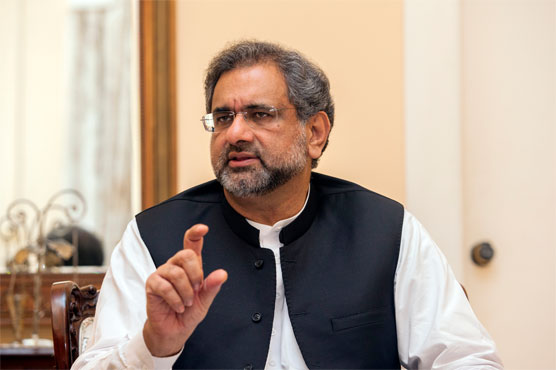LAHORE: Prime Minister Shahid Khaqan Abbasi believes political uncertainty is shattering investor confidence and negatively affecting the country’s economy before its heads to polls in 2018.
In an interview to Bloomberg, Abbasi said country’s economy is expected to grow 6pc till end of financial year 2017-18 by June next year, but corruption probes against various members of ruling party and religious protests across Pakistan were hampering investor confidence.
Pakistan earlier this week successfully raised $2.5 billion from international debt markets via a combination of Eurobonds and Islamic Sukuk for a period of 10 and 5 years respectively. This is expected to bolster the country’s ailing foreign exchange reserves and provide much needed support for budgetary payments.
Abbasi said there has been persistent uncertainty in Pakistan since the surfacing up of Panama leaks last year which claimed the scalp of ex-Prime Minister Nawaz Sharif who ended up being disqualified from office by apex court in July.
Adding to difficulties of Abbasi, he also took over finance portfolio after allowing embattled Finance Minister Ishaq Dar indefinite medical leave last week. Dar has been riled by corruption charges and been accused of money laundering for the Sharif family besides being indicted by the courts.
A protest by a religious party for over twenty days in Islamabad brought the city to a virtual halt and ended up in a botched operation last week before the powerful military stepped in and deadlock was broken, which resulted in the resignation of law minister, Zaid Hamid.
Unpredictability and uncertainty has plagued the country since removal of ex-PM Nawaz Sharif and led to biggest foreign outflows from Pakistani stocks in 2017 since the 2008 financial crisis. Abbasi added not only does this dent economic growth but also affects investor confidence.
Economic experts have been predicting that Pakistan may again seek assistance from IMF or ask China for bilateral support.
In a comment to Bloomberg, Mark Baker portfolio manager at Aberdeen Standard Investments said “The political environment in Pakistan has been deteriorating and further instability could come from the general election scheduled for 2018. Bonds have already materially under-performed to reflect the worsening political and macro outlook.”
Pakistan’s over-reliance on China-Pakistan Economic Corridor (CPEC) to kickstart the country’s economy has led to major rise in imports, which has also affected its current account position.
PM Abbasi on the contrary said, “This deficit is temporary as you are in expansion phase where machinery and other things are increasingly being imported,” he said. “This deficit will go away when the growth comes.”




